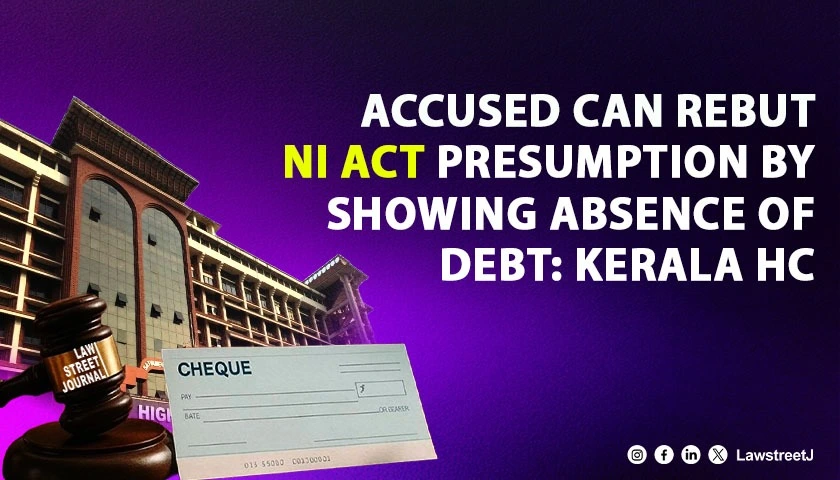Kerala: The Kerala High Court has clarified that an accused under Section 138 of the Negotiable Instruments Act, 1881, can rebut the presumption under Section 139 by referring to the particular circumstances of the case and establishing the non-existence of debt or liability on the standard of preponderance of probabilities.a
Justice Bechu Kurian Thomas delivered the judgment on October 22, 2025, while dismissing Criminal Appeal No. 222 of 2015 filed by the complainant challenging the acquittal of the accused by the Judicial First-Class Magistrate Court-II, Chalakudy.
The complainant had alleged that the accused had borrowed ₹3 lakh on June 12, 2011, and issued a cheque dated September 12, 2011, which was dishonoured due to insufficient funds. However, the trial court acquitted the accused, finding that the cheque was not supported by consideration and that the complainant failed to prove the transaction.
Upholding the acquittal, the court reiterated the settled legal principles governing the presumption under Section 139 NI Act. The Court noted that once the execution of a cheque is admitted, a presumption arises that it was issued in discharge of a legally enforceable debt or liability. However, this presumption is rebuttable, and the burden shifts to the accused to establish a probable defence.
Referring to the Supreme Court’s rulings in Kumar Exports v. Sharma Carpets, Basalingappa v. Mudibasappa, Rajaram v. Maruthachalam, and Rajesh Jain v. Ajay Singh, the Court reiterated that the accused can rebut the presumption by showing the non-existence of debt or liability through either of two methods: by conclusively proving that the debt does not exist, or by establishing its non-existence through the preponderance of probabilities based on the surrounding circumstances.
The Court observed that “an accused can rebut the presumption under Section 139 of the NI Act by preponderance of probabilities also. If neither of the above options is satisfied, the court is bound to accept the complainant’s case on the basis of the presumption, provided other legal requirements under the statute are complied with.”
Applying these principles, the Court found that the complainant’s own evidence supported the defence version. During cross-examination, the complainant admitted to the existence of a prior agreement (Exhibit D1) which indicated that only ₹1,84,000 was due from the accused, of which ₹20,000 had already been paid. The accused’s consistent version—that he owed only ₹20,000 and had issued a blank signed cheque which was later misused—was found to be more probable.
The Court concluded that the cumulative effect of the complainant’s testimony and documentary evidence made the defence version more probable and justified the trial court’s finding. Observing that the presumption under Section 139 did not arise in the facts of the case, the Court held there was no reason to interfere with the acquittal.
The appeal was accordingly dismissed.
Appearances: Sheejo Chacko, Advocate, appeared for the appellant. Sayed Mansoor Bafakhy Thangal, Sunil N. Shenoi, P. Viswanathan (Sr.), Ajith Viswanathan, and Sreeja V., Public Prosecutor, appeared for the respondents.
Case Title: Jose v. Jose & State of Kerala




![Kerala HC Quashes 498A Dowry Harassment Case Against Live-In Partner, Citing Lack of Relative Status [Read Order]](/secure/uploads/2023/08/lj_5693_1057c042-1e57-4e27-8c9e-25af0ec38ec4.jpg)
![Watching porn on mobile: Kerala HC highlights importance of mother cooked meals, outdoor sports [Read Order]](/secure/uploads/2023/09/lj_9155_Parental_supervision_of_mobile_phone_usage.jpg)
![Lakshadweep MP Mohammed Faizal Disqualified from Lok Sabha After Conviction Suspension Plea Rejected by Kerala High Court [Read Notice]](/secure/uploads/2023/10/lj_9640_87b5fd97-0e05-4ff8-9a99-3be1e4446192.jpg)




